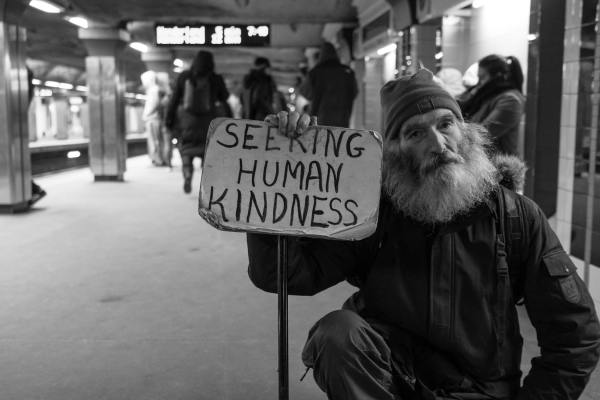Originally published November 17, 2019

Photo by Matt Collamer on Unsplash
This morning I posted a link to a blog I follow and mentioned that I believed being a decent human being was our number one goal. Oh, I also mentioned something that validated other beliefs and faiths. That earned a punch back. I was breaking the first commandment and following Jesus should be my number one goal. I responded that, in my opinion, doing what Jesus said to do was an act of following him. I also referenced Matthew 25:31-46. Then I thought for a bit and decided cherry picking may not be the best approach and I should widen my response. You know me, FB posts often grow into blog posts so here we go.
I have recently completed a manuscript that studies the Book of Job. This was a years’ long project. I have been told that the book is “thoroughly researched,” that the research is “dissertation level,” and that “it is the most comprehensive treatment of the Book of Job that I have come across.” Some of the concerns expressed were whether I could connect with a general market, or if I was going to be limited to those who study these things. I hope not. You see, I still believe there are those who are not scholars of sacred texts who hear the voice of our ancestors while they try to piece together what it means to live in a world that often passes understanding, that is often beyond our reason.
My studies took me all over the world and sent me to the words of many ancient civilizations and spiritual/ethical leaders. I found a drumbeat, one that spoke deeply to who I wanted to be, and I chose to share it.
For this bit, let’s focus on the Judeo-Christian scriptures (hopefully my Jewish friends will bear with me in this usage). Scripture wars where one side says, “what about?” and the other side says, “well here’s one for you,” get us nowhere. As noted above, I responded with the parable of the Sheep and the Goats in Matthew 25, a favorite of mine, which talks about how we treat fellow beings as being the metric by which our soul is measured. Can I back that up with any other passage? Well, yes, several. Here are a few.
Deuteronomy 10:17-19 is quoted often these days since it admonishes Israel on the doorstep of Canaan to love the resident foreigner, at least in part because once you were one.
Isaiah 10:1-4 is a declaration that those who enact unjust policies are as good as dead. That when you deprive the oppressed and steal from those who are widowed or orphaned, destruction is assured.
Matthew 5:1-12. The Sermon on the Mount would do us all good in this day and age. The common name of the Beatitudes says much about how we should view fellow beings.
Matthew 19:16-22, often interpreted as a mandate against wealth, it is really a well-defined lesson on how to apply wealth. It also has something to say about rules. The “rich man” who approached Jesus swore up and down that he was following the commandments and yet he felt something was lacking. He was told he needed to sell everything and give it to the poor. I don’t think Jesus was trying to tell rich people to be poor, I think he was making a comparison between following all the rules and having compassion. I know a few rich folks that use great mountains of their wealth to make this world a better place. Non-believing rich people. Can a person of faith do any less?
I’ve always loved 1 Corinthians 13:1, “If I speak in the tongues of men and of angels, but I do not have love, I am a noisy gong or a clanging cymbal.” I’m afraid I know a lot of clanging cymbals.
There are so many more passages that address how we treat others. Scripture also addresses the treatment of animals, and the earth that provides us with sustenance. There is a sense of responsibility when you are instructed not eat meat that was killed in a manner that poisons the flesh with the adrenaline of fear. Or, to eat those creatures which are scavengers and predators. Letting the land rest every seven years helps protect the fertility of the ground, gleaning allows those who have no other resources to find food and nourishment. Beyond the wars and smitting and flooding, there is much about how to be a decent human being; even when things are not going our way.
That’s where my hero steps in. Job tests the boundaries of what it means to live a righteous life, a life according to the rules. The rules so many treasure so dearly that humanity itself is left behind. Job demands answers, and (in my opinion) he gets answers. If the chapters referred to as the science lessons are to mean anything, it is crucial to put them in context. Once you can speak from a time and a place relevant to the author’s thoughts, wide vistas open and a light shines on an ever-creating universe. A universe where not every nanosecond or picosecond is focused on our personal wellbeing. Once we learn to see the world from a perspective Terry Pratchett called the universal view, then doing what is right in the world becomes a natural goal. You follow a Creator by becoming a positive and compassionate part of that creation.
Whether you are an academic, a curious layperson, or a member of the general public that just wants to see a different point of view on why there is suffering in the world, and what you can do in the face of it, come join me in the author’s study while we explore the riddle of Job.
Redefining Job and the Conundrum of Suffering was released in June of 2020.



No Comments